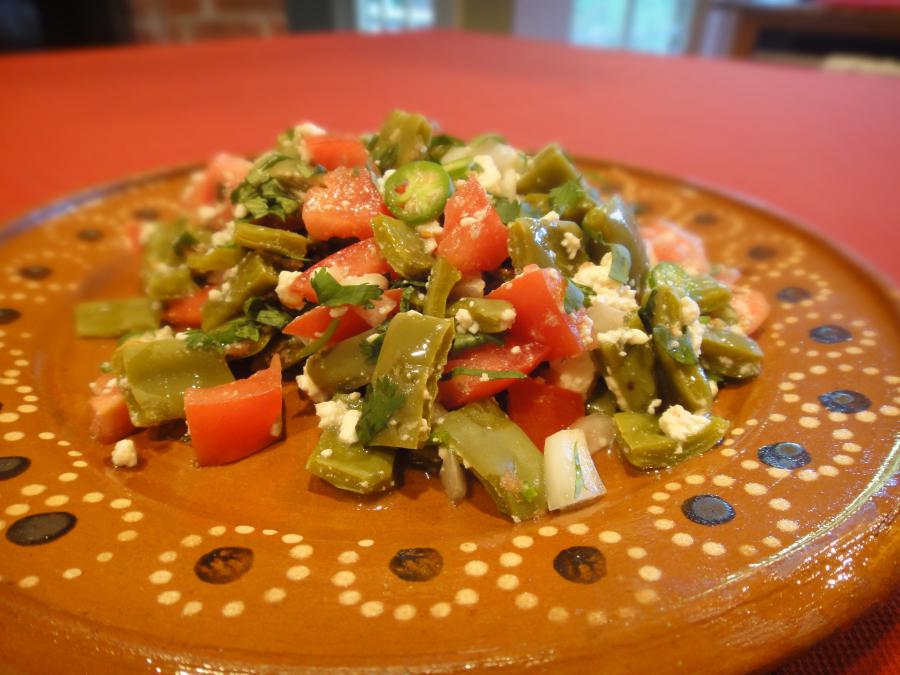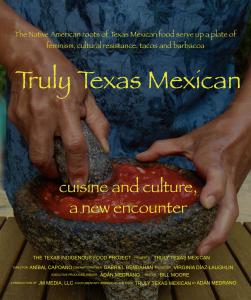
JM Media Announces The Completion of “Truly Texas Mexican,” A Film About Texas Native American Food
The Native American roots of Texas Mexican food serve up a plate of feminism, cultural resistance, tacos and barbacoa.
HOUSTON, TEXAS, USA, September 3, 2020 /EINPresswire.com/ -- “The history of the Native Americans of Texas was erased from the history books, but now with this film we are finally telling our truth” says Adán Medrano, the executive producer and writer of “Truly Texas Mexican,” a documentary that has just been completed by JM Media, LLC, based in Houston, Texas.
The 90-minute documenatry feature is Inspired by Medrano’s two recent award-winnig cookbooks with history published by Texas Tech University Press.
It's a road movie shot completely in Texas, in places like Houston, San Antonio, Corpus Christi and McAllen. The premise of the film is that the Mexican food of Texas has Native American roots with a direct line to today’s Texas Mexican American community. Chefs, artists and community leaders share intimate food experiences that shape their identity as indigenous people, facing a history of discrimination, dispossession and violence. Medrano says that over time and during conquest, Texas Mexican food sustained the memory of the indigenous Mexican American community and strengthened the bonds of community. "It's a living heritage," he says.
Medrano worked over two-and-one-half years with Virginia Díaz-Laughlin who is the producer. Both are native Texans whose families grew up cooking and enjoying the food that is celebrated in the film. Díaz-Laughlin discusses the technical work, the lighting and camera shots of traditional dishes like steaming carne guisada (beef stew), flour tortillas and nopalitos (cactus). The film style is definitely not the standard magazine glossy fare, according to Diáz-Laughlin. All the shots of food are in a family or community setting. “They are living, nourishing gifts of this land that we should hold sacred,” she says.
The director is Aníbal Capoano and the cinematographer is Gabriel Bendahan both award-winning filmmakers from Uruguay. The distinctive visual treatment of food emphasizes the cultural context. Shots of the food are in the context of a kitchen table, of family, community and hospitality. Capoano says that the trick is to capture the culture and the power of food as memory and as the bond of community. “It's the story of the power of Mexican American home cooking,” he says.
The story of the film begins with the home cooking or "comida casera" that was made famous in the late 1800s by indigenous businesswomen, chefs, who operated outdoor diners in Alamo Plaza in downtown San Antonio. The film tells this story using archival images. Later called chili queens, they were eventually harassed and forced out of business by new dining regulations of the growing city center.
But others followed in their footsteps. Maria Sanchez of McAllen says that the food she serves in her restaurant not only keeps important traditions alive, it supports the sense of community. “I bring them memories,” she says of her customers, as she points to dishes of “fideo”(pasta) and “caldo de res” (beef soup). They are family recipes, so different from what she calls “cardboard food” sold by Taco Bell and others. Leticia Perez in Brownsville, a chef and street vendor, says that “while there are people who feel a passion to cook this, the roots will continue.”
Graciela Sanchez, walking in front of the Alamo, explains that her grandmother was one of those “chili queens.” She learned that cooking offers a way of building bridges of understanding. “Food doesn’t just feed your body, it feeds your soul.”
The Ortega family in Westside San Antonio continues an ancient indigenous tradition, digging a hole in the backyard to cook a cow’s head, tending the fire through the dark of night. As morning breaks, the barbacoa is unearthed for an exhilarant fiesta of tortillas, tacos, salsa, conversation and abrazos (hugs). Food defines identity and nurtures community.
Other chefs, artists and community leaders in Corpus Christi, Raymondville and Harlingen share intimate food experiences that shape who they are today, facing a history of discrimination, dispossession and violence. Over time and during conquest, Texas Mexican food sustained the memory of the indigenous Mexican American community of Texas as a living heritage.
Medrano says that this unique cuisine opens up a view of what it means to be “American.” It offers a new type of encounter with the other, one of understanding, building a table where all are welcome.
JM Media plans to sign with a film aggregator to distribute it through video streaming services. It will also be available for individual purchase on Vimeo On Demand and on Amazon. The film has already received the endorsement of The Smithsonian and of the Hispanic Association of Colleges and Universities (HACU).
Funding was provided by major donors, Christine Ortega, Dr. Richard Jiménez, David Laughlin and Virginia Díaz-Laughlin.
Additional funding was provided by The National Association of Latino Arts and Cultures (NALAC), the Andrew W. Mellon Foundation, the Ford Foundation and the Surdna Foundation through a grant from the NALAC Fund for the Arts Grant Program, and by The Idea Fund, Houston, a re-granting program administered by DiverseWorks, Aurora Picture Show, and Project Row Houses and funded by The Andy Warhol Foundation for the Visual Arts
The release date and event will be announced on the website for the movie: trulytexasmexican.com
Adan Medrano
JM Communications
+1 713-524-1628
email us here
Visit us on social media:
Facebook
Twitter
LinkedIn
Distribution channels: Book Publishing Industry, Culture, Society & Lifestyle, Education, Food & Beverage Industry, Movie Industry
Legal Disclaimer:
EIN Presswire provides this news content "as is" without warranty of any kind. We do not accept any responsibility or liability for the accuracy, content, images, videos, licenses, completeness, legality, or reliability of the information contained in this article. If you have any complaints or copyright issues related to this article, kindly contact the author above.
Submit your press release


